(This is the text version of the supplementary video to Daniel chapter 8, “Alexander the Great comes to Jerusalem” which can be seen here.)
Here’s a little history to highlight the power of prophecy.  In Daniel 8, from 553 BC, we saw that Daniel was shown a vision of a goat with one horn. This goat was identified by the angel Gabriel as being prophetic of the Empire of the Greeks that was to come. Alexander the Great, and his empire, were the fulfillment of this, over 200 years later.
In Daniel 8, from 553 BC, we saw that Daniel was shown a vision of a goat with one horn. This goat was identified by the angel Gabriel as being prophetic of the Empire of the Greeks that was to come. Alexander the Great, and his empire, were the fulfillment of this, over 200 years later.
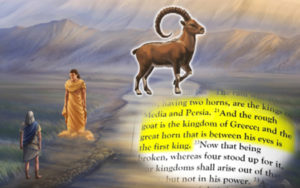 In Daniel 8:21 the angel Gabriel tells Daniel, “And the rough goat is the kingdom of Greece; and the great horn that is between his eyes is the first king.” The vision not only predicts the coming of the empire of the Greeks, but it also mentions “the great horn” as signifying its first king.
In Daniel 8:21 the angel Gabriel tells Daniel, “And the rough goat is the kingdom of Greece; and the great horn that is between his eyes is the first king.” The vision not only predicts the coming of the empire of the Greeks, but it also mentions “the great horn” as signifying its first king.
I’m going to be quoting from an ancient Jewish historian, Flavius Josephus. He was sometimes an associate and a negotiator for the Roman government in the first century AD. But he also was a loyal Jewish citizen of Israel who wrote perhaps the most famous secular history of Israel, “The Antiquities of the Jews”. I’ll be quoting from book 11, chapter 8, paragraphs 4 and 5.
Josephus tells of when Alexander the Great came to Jerusalem, during his conquests of the Middle East, around 332 BC. The high priest in Jerusalem, knowing that Alexander had recently destroyed Tyre and Gaza, poured out his heart to God for divine protection.
(Text in blue below is taken directly from “The Antiquities of the Jews”.)
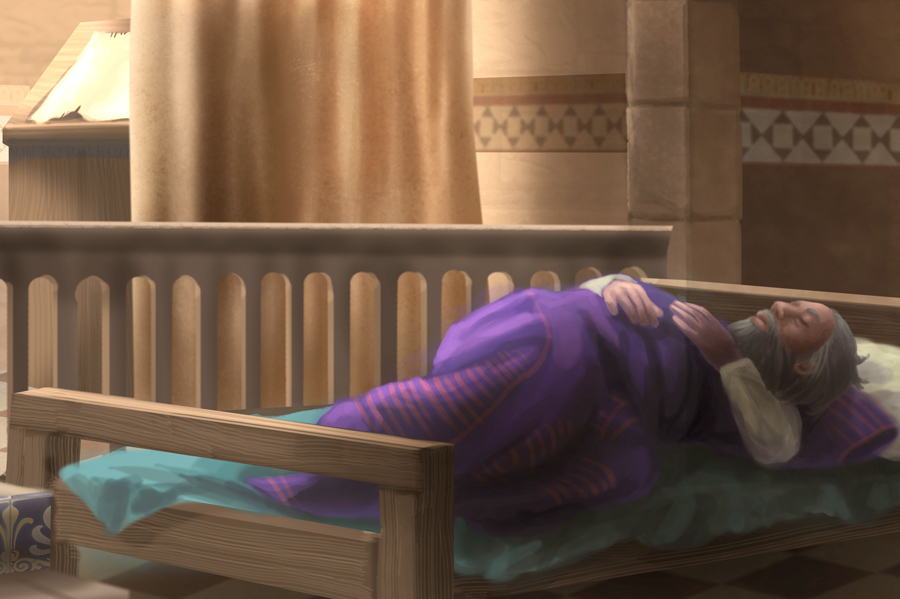 After that God spoke to the high priest in a dream “that he should take courage, and adorn Jerusalem, and open the gates. The rest of the people should appear in white garments. But the priests should meet Alexander in the robes of their priesthood, without fear, because God would protect them.”
After that God spoke to the high priest in a dream “that he should take courage, and adorn Jerusalem, and open the gates. The rest of the people should appear in white garments. But the priests should meet Alexander in the robes of their priesthood, without fear, because God would protect them.”
When Alexander was not far from Jerusalem, the high priest went outside the walls of the city in a procession, with the other priests and multitudes of citizens.
Alexander’s army was expecting him to plunder the city. But, when he saw the multitude at a distance, in white garments, and the priests in fine linen, the high priest in purple and scarlet clothing, Alexander approached by himself, showing respect to their God, and saluted the high priest.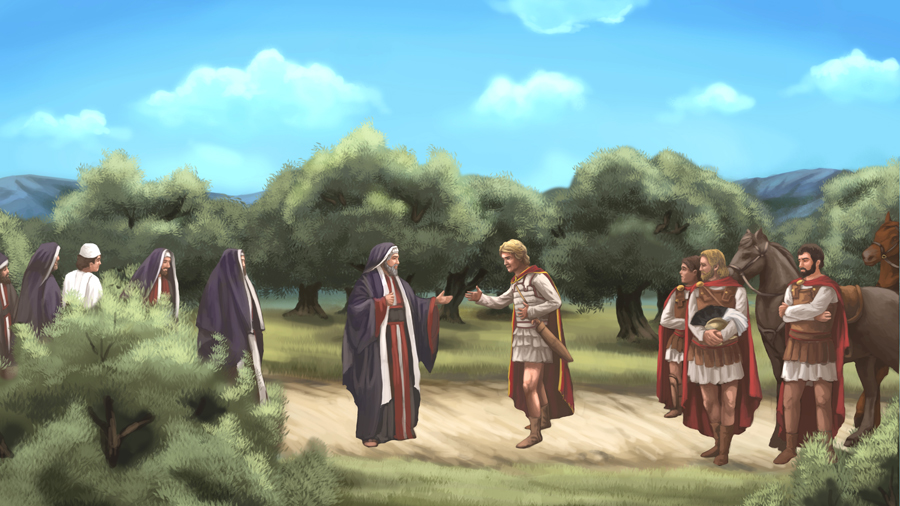
Those who’d come with Alexander thought he had lost his senses. 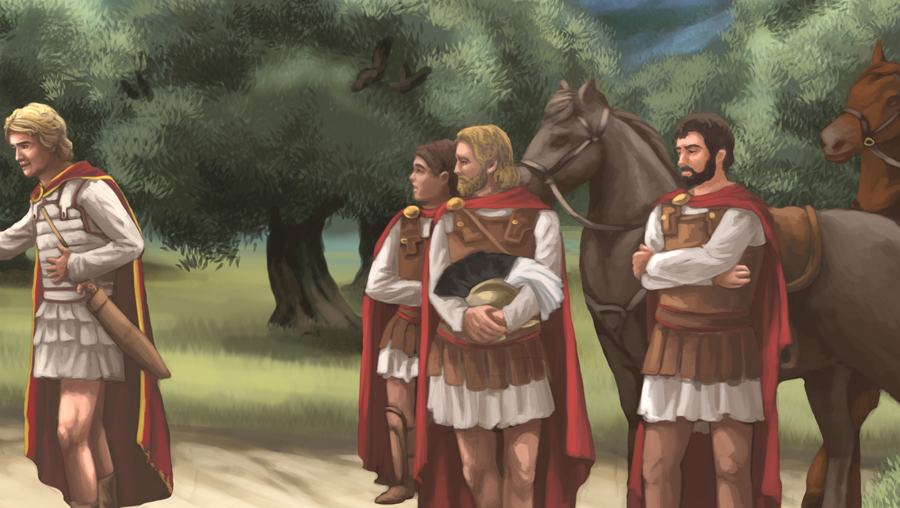
Finally one asked him how, when all others adored him, he should adore the high priest of the Jews?
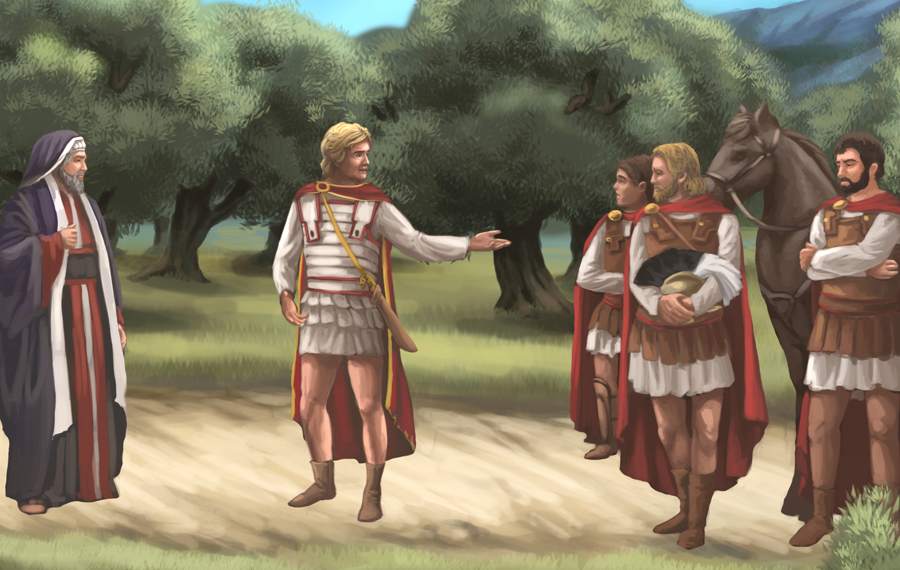 Alexander replied, “I did not adore him, but that God who has honored him with his high priesthood. I saw this very person in a dream, in these very clothes, when I was in Macedonia.
Alexander replied, “I did not adore him, but that God who has honored him with his high priesthood. I saw this very person in a dream, in these very clothes, when I was in Macedonia.
 Alexander and his primary forces were from Macedonia originally. In fighting the Persians, Alexander had three main battles, first at the Granicus River, then the battle of Issus, and the ultimate one, at Gaugamela.
Alexander and his primary forces were from Macedonia originally. In fighting the Persians, Alexander had three main battles, first at the Granicus River, then the battle of Issus, and the ultimate one, at Gaugamela.
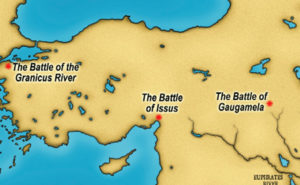 But Alexander is saying that, before he ever started his drive east to defeat the Persians, he’d had this dream in Macedonia that he is now describing to his followers here, outside the walls of Jerusalem.
But Alexander is saying that, before he ever started his drive east to defeat the Persians, he’d had this dream in Macedonia that he is now describing to his followers here, outside the walls of Jerusalem.
[Alexander’s dialogue from “The Antiquities of the Jews” continues.]
 I was considering with myself how I might obtain the dominion of Asia. And I saw this man who exhorted me to make no delay, but boldly to pass over the sea. He would conduct my army, and would give me the dominion over the Persians. I have not seen any other so clothed that way since then. And now, seeing this person, and remembering that vision in my dream, I believe I bring this army under the Divine conduct, and shall conquer Darius, destroy the power of the Persians, and that all things will succeed according to what is in my own mind.”
I was considering with myself how I might obtain the dominion of Asia. And I saw this man who exhorted me to make no delay, but boldly to pass over the sea. He would conduct my army, and would give me the dominion over the Persians. I have not seen any other so clothed that way since then. And now, seeing this person, and remembering that vision in my dream, I believe I bring this army under the Divine conduct, and shall conquer Darius, destroy the power of the Persians, and that all things will succeed according to what is in my own mind.”
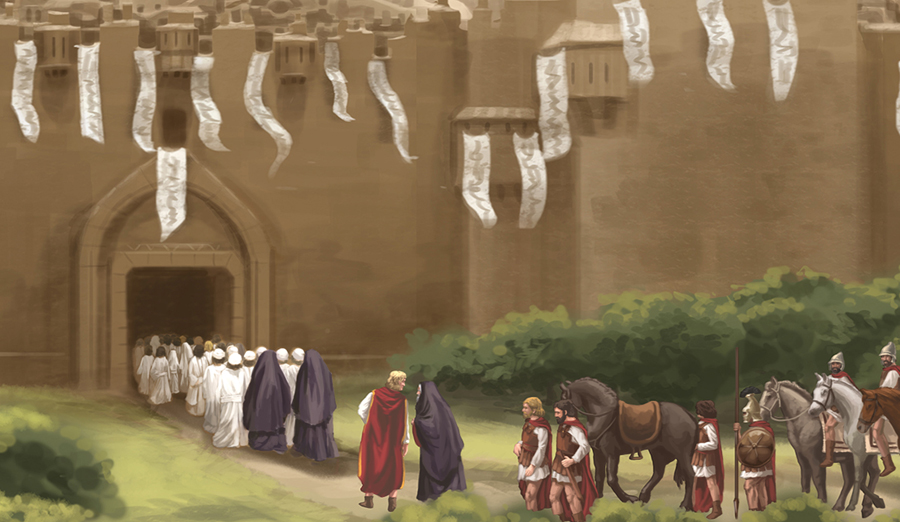 Then he gave the high priest his right hand and came into Jerusalem.
Then he gave the high priest his right hand and came into Jerusalem.
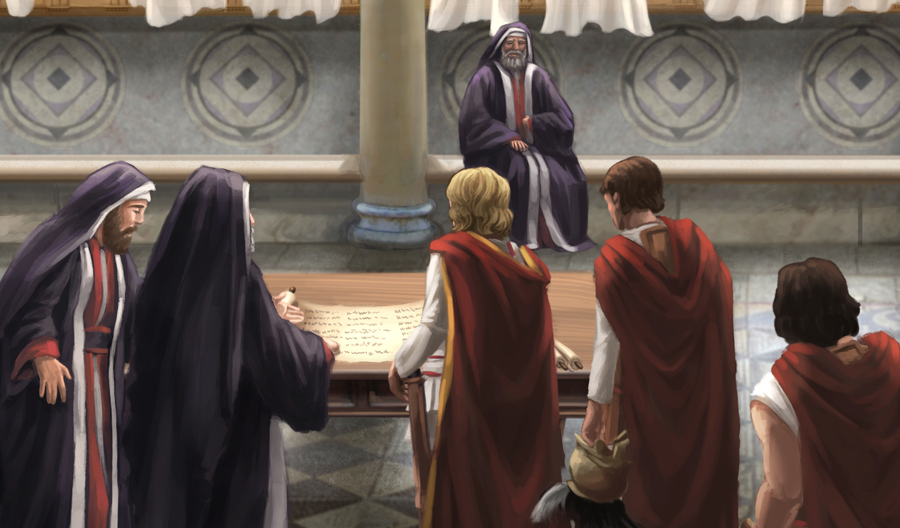 And, when the Book of Daniel was showed him where Daniel declared that one of the Greeks should destroy the empire of the Persians,
And, when the Book of Daniel was showed him where Daniel declared that one of the Greeks should destroy the empire of the Persians,
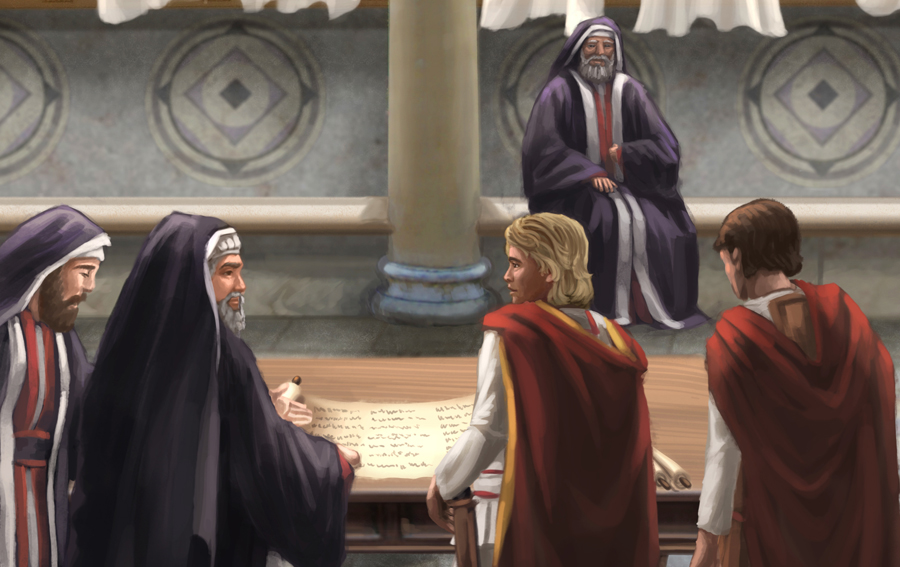 Alexander supposed that himself was the person intended.
Alexander supposed that himself was the person intended.
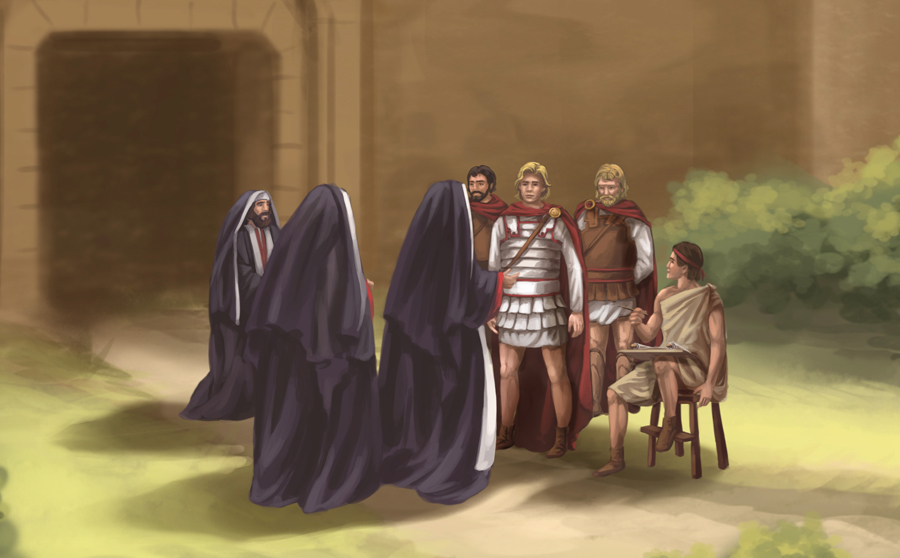 The next day Alexander asked them what they would want of him. The high priest asked that they might enjoy the laws of their forefathers, and might pay no taxes on the seventh year.
The next day Alexander asked them what they would want of him. The high priest asked that they might enjoy the laws of their forefathers, and might pay no taxes on the seventh year.
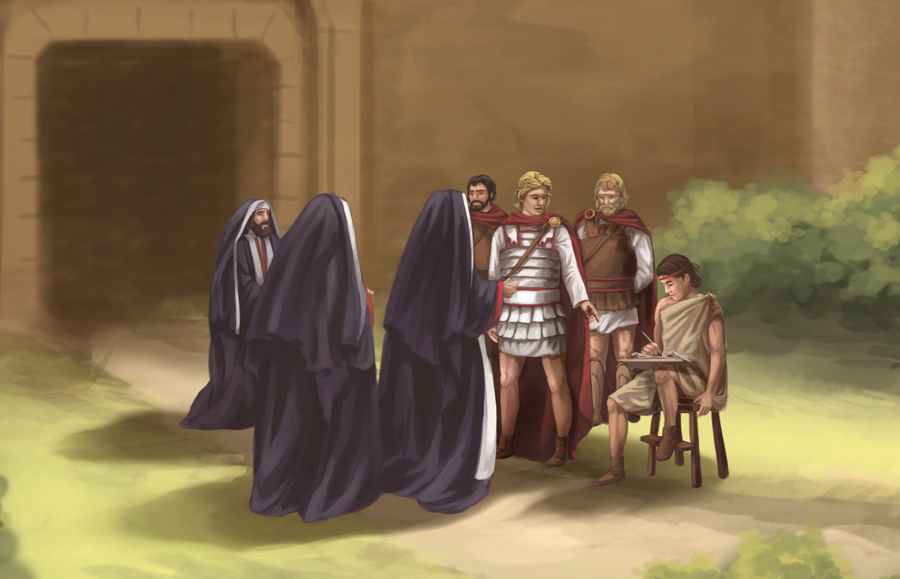 Alexander granted all they desired.
Alexander granted all they desired.
When Alexander the Great was shown Daniel’s prophecy by the priests in Jerusalem, he acknowledged that this was a prophecy about himself. Furthermore, years before this, he’d personally seen, in a dream, these ones in Jerusalem, dressed in priestial robes, coming to meet him. And this information is taken from a famous secular history book, written in the 1st century AD.
Why could this matter to us, over 2000 years later? To me, it’s another amazing proof of the veracity and certainty of Bible prophecy.
Here one of the most famous conquerors of all time is shown the prophecy about himself, which had been given to Daniel over 200 years before. Alexander acknowledged that it was about him and then asked the high priest what he could do for them.
And Alexander went on to be a benefactor of the Jewish people in his lifetime. So those who dismiss Bible prophecy and feel it’s not relevant to our times are doing so at their own peril. On the other hand, there are those who look for God to yet fulfill His Word, for the events of the endtime to come and the Millennial Kingdom of Jesus to be established. Bible prophecy was fulfilled so dramatically and tangibly in the secular world with Alexander in Jerusalem, reading about himself in Daniel Chapter 8. This should encourage us believers that it will yet be so in our times or times soon to come.
beautiful story.
Thank you for the wonderful, detailed description of Alexander’s visit to Jerusalem. It was a blessing to read how accurate God’s Word is. Merry Christmas
Alexander had pillaged and plundered many cities, often renaming them and requiring them to adopt the Greco-Macedonian culture. But not so for the city of Jerusalem. Alexander not only believed the prophecies in Daniel were about himself, but because of that belief, he granted great favor to the Jews. He allowed them to keep their own laws and culture, and gave them a massive break from paying tribute.